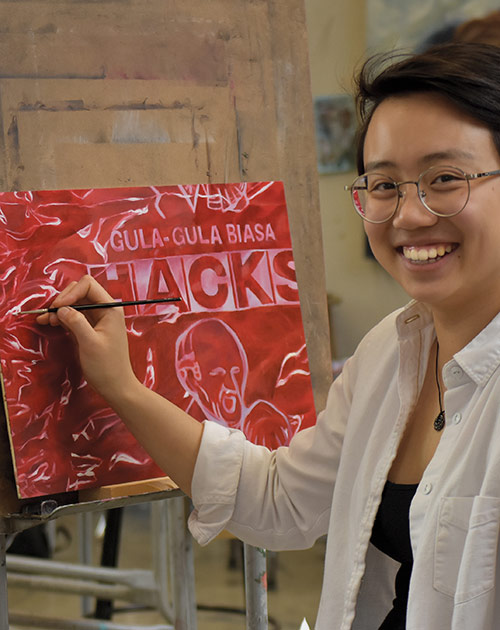Caitlyn Fong '19 explains the science of it

How do you preserve an art installation made of butter? That’s just one occupational hazard for an art conservator.
Pursuing a career in art conservation, Caitlyn Fong ’19—a chemistry major and studio art minor—mixed science and art for her honors senior research project. How do those seemingly separate majors go together?
“Science, predominantly chemistry, is involved in conservation,” said Fong. “It is used to investigate decay, to learn more about the process by which a piece was created and to analyze an object’s state.”
Her project explored the complexities of conserving contemporary art, so she worked with Professor of Chemistry Rick Schaeffer and Associate Professor of Art Brent Good.
“Caitlyn’s honors project in art conservation is a wonderful illustration of a rich cross-disciplinary field engaging two broad areas that, at first glance, might not seem to have much in common,” said Schaeffer.
While preservation of centuries-old masterpieces involves removing ancient layers of veneer or grime, today’s art poses a different set of challenges.
“Current artists are using all sorts of unexpected materials that create even more headaches for the conservators on staff at major institutions,” explained Good. “Art conservation is a perfect example of a discipline that requires an analytic understanding of chemicals and how they interact.”
Also, preserving current art can allow a conservator the opportunity to work directly with the artist. “Some of the artists are still living and can provide insight to their intent,” explained Fong.
Last summer, she completed a conservation internship at the State Capitol building in Harrisburg, Pennsylvania. After graduation, however, she is considering offers across the U.S., from Texas to Oregon.
“As the field of conservation is a less conventional one, most people start with internships and apprenticeships before going to graduate school,” said Fong, “as programs often have requirements for hands-on hours of work.”
With her Messiah degree in hand, she’ll preserve art for generations to come.
— Jake Miaczynski ’20 and Anna Seip